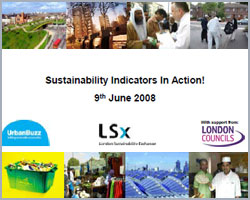Search
Project Coordinator
Ms Gayle Burgess
Address: LSx, 19-23 Ironmonger Row, EC1V 3QN
Location: View Map
Email: g.burgess@lsx.org.uk
Download Poster
No Poster for this project
11 :
ITS
Innovative Tools for Sustainability
 Environmental
and health inequalities are a real and substantive problem within
London and the UK. This mini research project brought together
planners, policy practitioners and community groups to focus on this
issue.
Environmental
and health inequalities are a real and substantive problem within
London and the UK. This mini research project brought together
planners, policy practitioners and community groups to focus on this
issue.
Project Aims
To develop a London wide approach to measuring and addressing environmental inequalities.
LSx’s approach through this short project was to:
1. Build the skills of built environment and other professionals to tackle these issues through their planning and decision-making
2. Develop a jointly held action plan to measure and address environmental and health inequalities
Background
Many London communities suffer disproportionately from poor air quality, energy inefficient housing, lack of access to green space or poor transport links. Health inequalities are a linked and equally serious symptom of unsustainable communities; life expectancy declines by a year for each of the six stops you travel eastwards along the Jubilee Line from Westminster to Canning Town.
Such inequalities can be seen as symptoms of unsustainable communities. There has recently been growing political will for a step-change in strategies to address these issues. In the climate change section of the Further Alterations of the London Plan published under the previous Mayoral administration the proposed wording was agreed: “He (the Mayor) will participate in efforts to redress the effects of environmental inequality such as the impacts of higher summer temperatures on the elderly and the problems of fuel poverty.”
Even with the political will, built environment and other professionals will need the skill sets to ‘do things differently’, so that environmental and health inequalities would actually be reduced rather than increased by future regeneration work. Whilst there are pockets of expertise and good practice, practitioners find the social and environmental aspects of planning complex, to say the least.
Methodology
LSx facilitated an interactive learning seminar held on 16th November 2007 at City Hall to build the skills of these professionals and enable them to tackle the issues through their work. Participants included policy makers, developers, built environment consultants, community groups, NGOs and other key stakeholders.
LSx added the findings from this event to its own desk research to reach a set of conclusions and recommendations.
Conclusions and Recommendations
Our key recommendations are that:
(1) London needs to create and implement a systematic way of monitoring environmental and health inequalities across the capital
(2) London’s built environment professionals need a number of tools to help them ensure that new projects reduce these inequalities. LSx has been working with partners the LSDC, LHC, GOL Shared intelligence and the LB Hounslow to create an integration tool, with prompt questions to support reflective practice. A copy of this tool is in the annex of the full report.
(3) Communities need to be empowered to work within the LAA and CAA process to lobby for the changes they want
Next Steps
LSx is encouraging key bodies and stakeholders such as the Greater London Authority to take forward these recommendations as part of its ongoing work programme funded by the City Parochial Foundation.
No articles items exist for this project